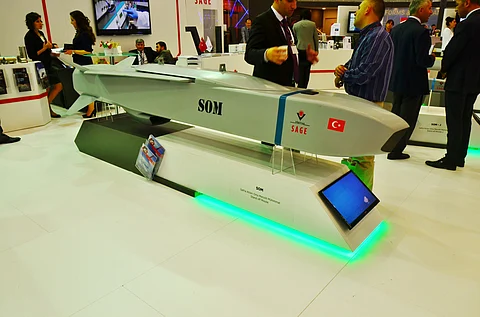

Turkey unveiled a series of advanced domestically developed weapons at the International Defense Industry Fair (IDEF) 2025 in Istanbul, marking a significant leap forward in the country's ambitions to become a major regional power and bolster its defense industry.
The centerpiece of the exhibition was the debut of the Tayfun Block-4, Turkey’s first domestically produced hypersonic missile. According to defense officials, the missile has a range of between 1,000 and 3,000 kilometers and is capable of reaching speeds of Mach 5, placing it firmly in the class of next-generation strategic weaponry.
Another notable development was the NEB HAYALET bunker buster bomb. Weighing 2,000 pounds, the precision-guided munition is designed to penetrate fortified structures such as command centers, bunkers, and critical infrastructure. Turkish defense officials noted that the bomb had been under development for over a decade, with successful test results presented during the expo.
The exhibition also featured a range of other advanced systems, including air-to-air and ground-to-air missiles, anti-ship missiles, loitering munitions, satellite launch vehicles, and UAVs. These displays highlighted the growing diversity and capability of Turkey’s indigenous defense sector.
Among the newly introduced systems, the GAZAP Thermobaric Bomb stood out for its destructive capability. The weapon reportedly produces approximately 10 fragmentation blasts per meter—compared to just three in standard munitions—and disperses up to 10,000 fragments upon detonation, making it particularly effective against personnel and soft targets.
Turkey’s expanding defense capabilities come at a time when Ankara is seeking greater regional influence, particularly in neighboring Syria. Following the collapse of the Bashar al-Assad government, Turkey has emerged as the dominant force in northern Syria. Last week, Syria’s interim authorities formally requested Turkish military assistance to help rebuild its armed forces.
Ankara's push for military self-reliance has intensified since its expulsion from the U.S.-led F-35 fighter jet program in 2019, following its acquisition of Russia’s S-400 air defense system. Since then, Turkey has accelerated efforts to build a comprehensive domestic defense ecosystem, which now includes a fifth-generation fighter jet program, the development of a homegrown aircraft carrier, and a layered missile defense initiative known as the “Steel Dome.”
Turkish officials have framed these developments as part of a broader strategy to achieve strategic autonomy, reducing reliance on NATO or Western suppliers and positioning Turkey as a standalone military power in the region.